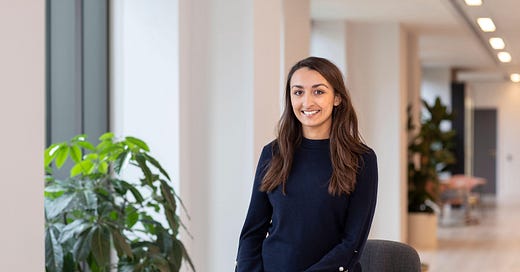Sarah Karmali: “Being mixed, you're constantly discovering new parts of yourself”
The editor on colourism, culture and coming from more than one reality
Hi, welcome back to Mixed Messages! This week, I’m speaking to Sarah Karmali, Digital Editor of Harper’s Bazaar. Sarah is of mixed Indian and white heritage, and hasn’t always felt as proud of her dual heritage as she is today. Here, we speak about her family’s African influences, colourism and how being mixed can lead to constant discoveries. Read it below.
How do you define your ethnicity?
I never know what to say. I always check ‘mixed white and Asian’ on forms, but that’s very reductive. My mum was English, her side of the family grew up in southeast London. My dad is Indian but was born in Kenya, like three generations of his family before him. My brother and I, as far as I’m aware, are the first generation on that side of the family to be born in the UK.
Has the way you’ve thought about yourself changed over time?
It’s changed a lot. As I’ve gotten older, I’ve become more curious about the Indian side of me. Going to a predominantly white primary school, fitting in always felt very important to me. Consciously or subconsciously, I was always aware of the fact that I was slightly different, so I went the extra mile to be accepted. I might have even been aware I was doing it when I was younger.
Now that I’m older, I’m definitely more proud of being mixed-race. I want to learn more about my heritage, I feel a certain amount of guilt about not wanting to explore it more when I was younger actually.
I’ve been thinking about what my dad must have gone through when he arrived in England. His family must have been so focused on building a future, so now it’s our responsibility to be curious and ask questions. It’s not all on them to tell us our history.
Have you ever faced any racism?
I’ve never experienced intentional violence or racism. There have been comments – in the ‘90s, the word ‘paki’ was thrown around so much. I just laughed it off, I wanted to show that I wasn’t offended by it. I almost felt like they weren’t talking about me. When a boy stuck a sticker on my forehead and told me “you’re a paki now,” I just remember saying “no I’m not.”
I don’t claim to have experienced the extent of racism that other people have – I’ve definitely not had the same experiences as darker-skinned relatives – but I certainly know what it’s like to feel different. I’ve also experienced colourism my entire life, even before I knew the word. My Indian family would praise me for being fair, while in England people would say I had a great tan. It’s a confusing message to grow up with.
How have you connected with your Indian culture?
It was something my dad did with his family, so I didn’t go to the mosque here – they’re now based in Vancouver. I found it quite an alienating experience, because I didn't speak the language and I had to sit separately from my dad. Now, I’ll go with my nan in Canada. It means a lot to her. It’s also a social thing where I can see my friends, but I’m not a religious person.
Did you ever feel different to your British Asian friends?
In secondary school I had friends with varying backgrounds, but none of them felt quite like me. In comparison to some of the Indian girls, I felt like a bit of a fraud, so I tended to downplay that side of myself.
I recently interviewed humanitarian Elizabeth Nyamayaro, the author of I Am A Girl From Africa, and she opens each chapter of her book with an African proverb or saying. I suddenly realised that these were things my grandmother said. I always assumed they were part of her Indian culture, but there’s a lot of African influence in there too. What’s so fascinating about being mixed-race is that you're constantly discovering new parts of yourself and your identity.
Is there anyone mixed you look up to?
It was amazing to see Naomi Scott as a Disney princess. I know there’s problematic elements to her casting, but the fact someone like her is being given these sorts of roles is great. At school, I always had to be Mel B, even though I was more of a Posh.
Do you think being mixed has influenced your career in any way?
One of the great advantages of being mixed-race is that you can immediately see opportunities in front of you because you come from more than one reality. You’re not one type of person. It can also give you more empathy to see the world from more than one point of view.
Can you sum up your mixed identity in one word?
Opportunity. It can be what you make of it.
Mixed Messages is going on a Christmas break! We’ll be back in January, so make sure to subscribe to get our first newsletter of 2022.
Enjoy Mixed Messages? Make my Christmas and support me on Ko-Fi! Your donations, which can start from £3, help me pay for the transcription software needed to keep this newsletter weekly, as well as special treats for subscribers.
Mixed Messages is a weekly exploration of the mixed-race experience, from me, Isabella Silvers. My mom is Punjabi (by way of East Africa) and my dad is white British, but finding my place between these two cultures hasn’t always been easy. That’s why I started Mixed Messages, where each week I’ll speak to a prominent mixed voice to delve into what it really feels like to be mixed.




